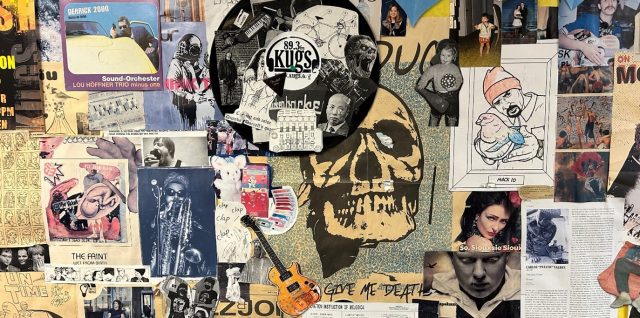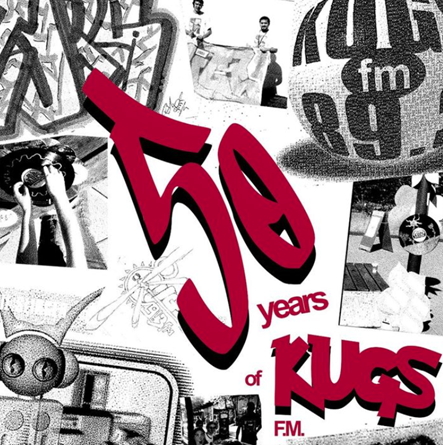
Meet KUGS: a radio station at Western Washington University in Bellingham. They focus on music and bridging the gap between university students and community members, and have been doing so for 50 years, first going on air in January 1974. KUGS’ 50th anniversary was officially last winter, though they plan to continue events and celebrations all year, including programming and anniversary merchandise.
Jamie Hoover is the current staff manager of the radio, which comprises around 80 members, most of whom are student volunteers, with some paid jobs. Students have been passionate and dedicated to having a full-power station since its creation in one of the old residents buildings. Jamie talked with us about the 50th anniversary, upcoming plans, and the role KUGS has in the community and local music scene, recording local bands.
Below is the interview with Jamie. Responses have been edited for length, clarity, and order.

Grey Cooper: How would you define the mission of KUGS?
Jamie Hoover: We’re an activity that’s not curriculum based for associated students at Western Washington. So, we have student employees, and myself, and volunteer student volunteers. Mostly, it’s student driven for sure, with high student agency, and we really promote student interest. KUGS being a Pacifica affiliate was driven by a student who did an internship at Pacifica, in the late 90s, like 1996-97, and came back and was really enthusiastic as the student program director about working to get KUGS to be a Pacifica affiliate. At that time, KUGS was broadcast by satellite, so they put in satellite dishes and all that interconnect stuff. Even when I came in the early 2000s, it was still receiving things from the satellite instead of web based. It was kind of like a whole different way of doing radio. The students were really interested in what was going on in alternative media and what wasn’t being represented in mainstream media and bringing that to the community here in Bellingham.
Grey Cooper: That’s quite an evolution of technology. Speaking of evolutions, it’s been KUGS’ 50th birthday recently.
Jamie Hoover: Yeah, it’s been on the air since 1974. I’ve been at a couple college stations that started in the early 70s, almost the same time. I mean, this was really low power 10 Watt stations and stuff. KUGS and many stations were 10 Watts into the mid-80s. They were able to do applications to up their wattage in the mid-80s. And so, you just went from 10 Watts to like 100 watts in the 80s. And then now, we broadcast at 950 Watts, which doesn’t sound like a lot, but we have the restrictions of being so close to the Canadian border that we have to kind of watch some of those things – but it gets out to our community and county. And now webcasting and apps and all of those kinds of things. But we still broadcast on terrestrial radio.
Grey Cooper: What are some defining moments of the last 50 years?
Jamie Hoover: Getting the power increases to eventually you know, be on a full power station webcasting – KUGS was one of the second stations in the country to webcast when we started webcasting live.
With the 45th anniversary it was fun to watch all these people who brought in like, you know, their daughters to stand in front of the vinyl collection and get pitches. So we’ve had the legacy of like somebody’s dad, who was the morning show host, and then they were the morning show host.
Grey Cooper: How has KUGS grown over the last 50 years?
Jamie Hoover: There’s always been 80 or so volunteers on the air and a handful of student employees that handle everything from music direction to engineering, and news and public affairs, programming, and training. So, I think that has continued that student dynamic of wanting to represent what the students want to hear on the radio. But also, part of our mission statement is to serve as a bridge from the campus to the community. One of the ways that we do that is, not only through community issue programming and public affairs, but with public service announcements, event announcements, and community calendars, so that folks know what’s happening on campus. And so folks on the campus know what’s happening in the community, making sure that we all know that we live in this one place.
Grey Cooper: Yeah. I’ve been curious about that. I did a lot of community work when I was in university and bridging that gap was always kind of difficult.
Jamie Hoover: Yeah, we try to work really closely with that. There’s a large music scene here, even though we’re kind of a small town, there’s a lot of venues that have music, for the students that they can go out and hear music by a local artist.
Grey Cooper: Your programming has a music focus. What drives what artists are shown and which people are featured?
Jamie Hoover: We have two music directors, and they go through what submissions have been coming through. And they listen to it, and they see what’s out there. We have a list of things the volunteers would like to see on our rotational wall, like daytime programming music for the masses, the new-music Friday mix. And the new music and how it goes through the system is based on what the volunteers are playing. So it’s really determined by those folks who do the shows. But, we have a huge physical library, we still have vinyl, we have turntables, like 25,000 albums, you know, just a huge collection. And we’re still a physical station. So we still are kind of like, pen to paper. And, you know, people are playing physical copies and things like that. We’re not paying for a digital system, yet, we’ll probably get to that point, as most of the things are coming in that way, but we haven’t digitized our library or anything like that.
Grey Cooper: Are there any upcoming projects you’re excited about?
Jamie Hoover: I mean, for sure. The staff are very excited about developing 50th anniversary swag. We’ve also been rebuilding since the pandemic. And so, the staff are very excited to get back on the ground, because it’s a good experience for the students. So that’s what I’m looking forward to.
